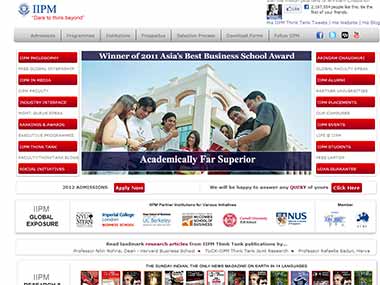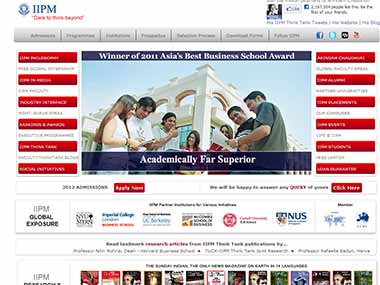The blocking of 73 URLs related to Indian Institute of Planning and Management (IIPM) was done by the Dabra district court, Gwalior, based on a defamation suit filed by one Ruchiv Sharma. According to the court order, posted on Indian Law and Technology Blog, “the plaintiff is an exclusive CEP (part of counselor engagement programme) of IIPM in this region.” As part of the agreement with the institute, Sharma guides students in the region on courses offered by the institute, said the petition. The plaintiff’s argument is that the plethora of misleading and defamatory information related to IIPM and its honorary director, Arindam Chaudhuri, has caused him grave professional loss and personal trauma. “Numerous parents of students who have joined the IIPM on the recommendation of the plaintiff have read the defamatory content on the website and have been calling up and shouting on the plaintiff and his family members. He is facing hostility from society, friends, relatives due to patently false and defamatory material,” read the petition. [caption id=“attachment_639800” align=“alignleft” width=“380”]  Screengrab of IIPM website[/caption] List of sample URLs submitted by the plaintiff before the court, included “IIPM fraud: UGC notice on IIPM university.” Sharma has demanded Rs 50 lakh in the suit for damages caused to him by negative information related to IIPM. Google India private limited, Google Incorporation, USA and Weebly Incorporation, USA are defendants in the suit.The petitioner has accused Google.com and Google.co.in of consciously, willing and knowingly indulging in defamation of IIPM and Chaudhuri. A google search for the institute or Arindam Chaudhuri, leads to suggestions such as “IIPM fake” and “IIPM fraud”, submitted the petitioner. The details of the complaint confirm the fears of free speech activists that websites can be blocked for the slightest reason. The information in this case was blocked not due to any pressing threat to national security or law and order but because it contained negative information. And this in turn caused some measure of inconvenience to a consultant whose business is to advise students on courses offered by that same educational institute. There is any number of sites offering negative opinions on a wide variety of educational institutes on the web. The question is whether these too will be deemed illegal merely because it contradicts the advice offered by any particular educational consultant. “When there is clear imminent danger or threat to the society, as in case of possible rioting, immediate removal of content without notifying and hearing the other party is understandable. But defamatory content does not fall in this category. Decisions on such largely civil matter should be taken with due deep consideration, after listening to all parties. And by far the considerations of free speech should have overwhelming weight in making decisions,” Parminder Jeet Singh, executive director of IT for change, a Bangalore based organisation which works on internet governance issues, told _Firstpost_ . Also of note is the fact that the petitioner has made a case only against online media arguing that the mainstream media supposedly do their due diligence before publishing a story/article and the accountability lies with the editor. “Whereas the online media largely remains with unidentified and irresponsible persons who can use online media for their own personal vendetta, grudges, jealousy by publishing false and defamatory content against someone,” read the petition, which demanded intermediaries to filter defamatory and false content from search. “Many users are not capable of discriminating intelligently about the information they found online and would not bother to know the reality. And would come away with negative impression about IIPM,” said the petition,” said the petition. This raises the question as to whether the courts should be in the business of restricting the information available to potential students – and to protect the businesses of consultants whose success relies on selling the merits of any particular institution. There is no information as to whether Chaudhuri, for example, informed his students that IIPM is not recognised by the UGC. And whether the courts believe that students have the right to that information. In a statement issued after the court ordered blockes, Chaudhuri hd said “I am glad that defamatory links with malicious interests have been ordered to be removed.” Commenting on block related to UGC, he had said on the behest of his competitors, UGC was spreading misleading information about IIPM. Read Chaudhuri’s entire statement here . Prabir Purkayastha of Knowledge Commons, an organisation which promotes open source information, said that in cases, where it’s not difficult to trace the person/organization publishing the questioned content, department of telecommunication should intimate the same about the court order regarding the content being taken offline.
The plaintiff’s argument is that the plethora of misleading and defamatory information related to IIPM and its honorary director, Arindam Chaudhuri, has caused him grave professional loss and personal trauma.
Advertisement
End of Article


)

)
)
)
)
)
)
)
)



